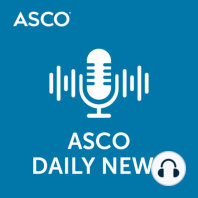25 min listen
#GU22: Learning From the PROpel and MAGNITUDE Trials
FromASCO Daily News
ratings:
Length:
10 minutes
Released:
Mar 1, 2022
Format:
Podcast episode
Description
Dr. Neeraj Agarwal, ASCO Daily News editor-in-chief, and director of the Genitourinary Cancers Program at the University of Utah’s Huntsman Cancer Institute, shares key takeaways from the PROpel and MAGNITUDE trials in mCRPC, featured at the 2022 ASCO Genitourinary Cancers Symposium. Transcript: ASCO Daily News: Hello and welcome to the ASCO Daily News Podcast. I'm Geraldine Carroll, a reporter for the ASCO Daily News. Today, in our continuing coverage of the 2022 ASCO Genitourinary (GU) Cancers Symposium, Dr. Neeraj Agarwal, the editor-in-chief of the ASCO Daily News will highlight promising advances in metastatic castration-resistant prostate cancer. Dr. Agarwal has no conflicts relating to the topic of this episode, and his full disclosures are available in the show notes. Disclosures of all guests on the podcast can be found in our transcripts at asco.org/podcasts. Dr. Neeraj Agarwal: Hello and welcome to the ASCO Daily News Podcast. I'm Dr. Neeraj Agarwal, the director of the Genitourinary Cancer Program, and professor of medicine at the University of Utah Huntsman Cancer Institute, and editor in chief of the ASCO Daily News. I'd like to start with the PROpel trial followed by a discussion on the MAGNITUDE trial. So, Abstract 11 was on the results of the PROpel trial and presented by Dr. Fred Saad from the University of Montreal. PROpel is a randomized phase 3 trial, which evaluated the efficacy and safety of olaparib, a PARP inhibitor plus abiraterone versus this placebo plus abiraterone in the first-line metastatic castration-resistant prostate cancer setting. Patients were allowed to have docetaxel chemotherapy is given in a metastatic castration-sensitive prostate cancer setting. Enrollment in the study was independent of the effects in the homologous recombination repair pathway. The primary endpoint was investigator-assessed radiographic progression-free survival (PFS) with multiple secondary endpoints, including overall survival and safety. Approximately 800 patients were randomly assigned to the novel combination of olaparib plus abiraterone or placebo plus abiraterone. Baseline characteristics were well-balanced between the treatment arms, including homologous recombination repair or HRR mutation status. At the pre-planned interim analysis results show the trial meets its primary endpoint with significant improvement in radiographic PFS for all patients receiving the combination therapy versus control, regardless of the presence of homologous recombination repair gene mutations. Median PFS was 24.8 months versus 16.6 months for patients receiving olaparib plus abiraterone versus placebo plus abiraterone respectively with the hazard ratio of 0.66, and a P < 0.0001. This translates into a 34% reduction in risk of progression or death. Overall survival results are still immature with only 29% [of patients experiencing events] thus far. It is interesting that even patients deemed negative for homologous recombination repair gene mutations showed significant improvement in radiographic PFS when treated with the combination of olaparib plus abiraterone versus placebo plus abiraterone. Regarding the adverse effects, they were what you would expect from the combination of a PARP inhibitor, such as olaparib and abiraterone. We saw a higher sequence of all great events of anemia, fatigue, and nausea in the combination arm. While anemia was the only grade 3-4 adverse event observed at a significantly high frequency in the combination arm. It is also important [that] we get a better understanding of the molecular mechanism by which patients who are homologous recombination repair mutation-negative are benefiting from the combination treatment as well. The next trial in this context, or this team, was the MAGNITUDE trial. Abstract 12 was presented by Dr. Kim Chi from British Columbia Cancer Center in Vancouver, Canada. MAGNITUDE is a randomized phase 3 trial evaluating the efficacy and safety of niraparib plus abi
Released:
Mar 1, 2022
Format:
Podcast episode
Titles in the series (100)
Dr. Derek Raghavan Has a Remedy to Mitigate Financial Toxicity in Cancer Treatment: Transcript: Dr. John Sweetenham: Hello, I'm John Sweetenham, Associate Director of Clinical Affairs at UT Southwestern's Harold C. Simmons Comprehensive Cancer Center, and the guest host of ASCO Daily News Podcast today. I'm joined by my friend and... by ASCO Daily News
